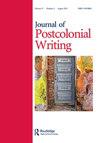“Musée de l’absence” and “Postcolonial flâneuse”
IF 0.4
3区 文学
0 LITERATURE
引用次数: 0
Abstract
"“Musée de l’absence” and “Postcolonial flâneuse”." Journal of Postcolonial Writing, ahead-of-print(ahead-of-print), pp. 1–2 Author’s noteThese poems are extracted from a wider collection of poetry and prose written as part of a creative-critical doctoral project titled “The Ontology of The Postcolonial Flâneuse: Decolonisation in British Muslim Women’s Writing”. Both poems engage with the view of the British Muslim woman as a postcolonial flâneuse to switch the role of the western gaze on British Muslim women to a British Muslim woman’s gaze on western cities and crowds. The postcolonial flâneuse highlights the need for inclusion of religious and cultural identity and consciousness that effects the existence, observation, and ideas of women strollers from marginalized groups and identities in the city. The poems are intended to contribute to wider discussions of re-examining the dominant model of flânerie in the context of colonial legacies within current society, such as class, race, and gender privilege and how the postcolonial flâneuse readdresses and destabilizes these within the “western hierarchy” framework.Additional informationNotes on contributorsRamisha RafiqueRamisha Rafique is a Nottingham Trent University (NTU) Vice Chancellor Bursary-funded PhD candidate at NTU. Her creative-critical doctoral thesis explores the ontology of the postcolonial flâneuse, considering, class, language, religion, and global technological advancements. Her research interests include Islamophobia, British Muslim women’s writing, and flânerie. Ramisha’s poetry has featured in Bystander (Laundrette Books, 2017) and on the NTU Postcolonial Studies Centre website more recently (2021).缺席的博物馆 "和 "后殖民的艳遇
" mussame de l ' missing "和"后殖民时期的fl neuse "后殖民写作杂志,印刷前(印刷前),第1-2页作者的笔记这些诗是从一个更广泛的诗歌和散文的集合中提取出来的,作为一个创造性批判性博士项目的一部分,题为“后殖民flnuse的本体论:英国穆斯林妇女写作中的非殖民化”。这两首诗都将英国穆斯林女性视为后殖民时期的flnneuse将西方对英国穆斯林女性的关注转变为英国穆斯林女性对西方城市和人群的关注。后殖民时期的fl neuse强调了包含宗教和文化身份和意识的必要性,这些身份和意识影响着城市中边缘化群体和身份的女性漫步者的存在、观察和想法。这些诗歌旨在促进更广泛的讨论,即在当前社会的殖民遗产背景下,重新审视fl的主导模式,如阶级、种族和性别特权,以及后殖民时期的fl是如何在“西方等级制度”框架下重新审视和破坏这些模式的。ramisha Rafique是诺丁汉特伦特大学(NTU)副校长奖学金资助的博士候选人。她的创造性批判性博士论文探讨了后殖民时期flalnese的本体,考虑,阶级,语言,宗教和全球技术进步。她的研究兴趣包括伊斯兰恐惧症、英国穆斯林女性写作和flaknerie。拉米沙的诗歌曾在《旁观者》(Laundrette Books, 2017)和最近的南洋理工大学后殖民研究中心网站(2021)上发表。
本文章由计算机程序翻译,如有差异,请以英文原文为准。
求助全文
约1分钟内获得全文
求助全文
来源期刊

Journal of Postcolonial Writing
LITERATURE-
CiteScore
0.80
自引率
0.00%
发文量
73
期刊介绍:
The Journal of Postcolonial Writing is an academic journal devoted to the study of literary and cultural texts produced in various postcolonial locations around the world. It explores the interface between postcolonial writing, postcolonial and related critical theories, and the economic, political and cultural forces that shape contemporary global developments. In addition to criticism focused on literary fiction, drama and poetry, we publish theoretically-informed articles on a variety of genres and media, including film, performance and other cultural practices, which address issues of relevance to postcolonial studies. In particular we seek to promote diasporic voices, as well as creative and critical texts from various national or global margins.
 求助内容:
求助内容: 应助结果提醒方式:
应助结果提醒方式:


